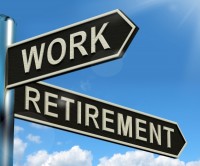I am constantly working with young working Americans to set aside systematically just a little money for their own retirement. If you look at government statistics from the department of Employee Benefit Research Institute, Americans are not doing too well. According to the EBRI 33% of working Americans have not started a retirement account? That 50% have managed to save only $2,000 for their retirement. And 66% of working Americans have less than $50,000 saved in their retirement accounts.
A great exercise is to have the 30 year old I am working with imagine themselves as an 80 year old. So, hypothetically, in 2063 time travel is possible. You travel back 50 years to 2013 to talk to 30 year old you. Are you going to be happy with the money you saved for your golden years or are you still going to be getting up and going to work every day at age 80, because you didn’t save enough for retirement? What will be your health at age 80? What skills will you still have at age 80? At this point, do you believe the money you waste at Starbucks, movie tickets and popcorn, Red Bulls, cool sunglasses and imported beers will seem as important? I am betting that it won’t.
The reason most people don’t save enough for retirement is that Wall Street has brainwashed most Americans that it takes large sums of money to invest. Reality is, it only takes a system in place to set aside just a little bit of money each week and let time and compounding interest work for them. Most Americans let time and compounding interest work against them. They have mortgages, car loans, credit card debt and revolving credit. The time and compounding is working in favor of the mortgage companies and banks, not them. We must get out of debt and systematically save for our own futures.
Our system is set up to “pay yourself first”. Let’s look at a quick example of compounding interest. If a 30 year old man simply saves $1,000 per year, which is only $2.74 per day. Let’s use a long term example of averaging 8% interest in a tax deferred annuity for 30 years. He will contribute in that time period $35,000. However, with time and compounding interest he will have successfully saved $186,102 at age 65. If he just simply didn’t touch it until age 70 the account would be worth $279,781. That is 8 times as much as he saved! So, the next time you reach for $2.74 to buy a cup of coffee or an energy drink, please think what you could really do for your own future. That is the very minimum working Americans need to be saving to avoid working into their 80s.
“The most powerful force in the universe is compounding interest”.— Albert Einstein
Tim Wilhoit is owner/principal of Your Friend 4 Life Insurance Agency in Nashville, TN. He is a family man, father of 3, entrepreneur, insurance agent, life insurance broker, salesman, sales trainer, recruiter, public speaker, blogger and team leader with over 25 years of experience in sales and marketing in the insurance and beverage industries.
Image courtesy of Stuart Miles at FreeDigitalPhotos.net



If only I started saving that $3 a day years ago! How many of us spend more than three dollars a day on coffee?
Amen, Jack. If only we knew then what we know now.
Just as important is the financial vehicle in which young people are saving. Conventional wisdom has taught us to rely mainly on three areas. Social Security, 401k’s/IRAs and our home equity. Most people believe they control these three things but they don’t. The conventional wisdom about preparing for the future is flawed and government and banks are complicit in perpetuating the conventional wisdom. Worse yet, most people don’t realize what the impact of this lack control means to them currently and more importantly, in the future (80 yrs old). So if you are 30 yrs old now, learn what these options are.
I agree Skipper. Most working Americans just need to take the first step to setting up a system to save. Sadly, most have forgotten the rule of pay yourself first. Thank you for sharing.